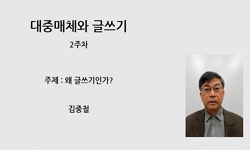이 논문은 조선시대 사대부들이 생활공간에 의미를 부여하고 창조하며 교환하는 과정을 `記`라는 글쓰기 양식과 관련하여 해명하는 것을 목적으로 삼는다. 이를 위해 18세기 경화세족인 耳...
http://chineseinput.net/에서 pinyin(병음)방식으로 중국어를 변환할 수 있습니다.
변환된 중국어를 복사하여 사용하시면 됩니다.
- 中文 을 입력하시려면 zhongwen을 입력하시고 space를누르시면됩니다.
- 北京 을 입력하시려면 beijing을 입력하시고 space를 누르시면 됩니다.

조선후기 사대부의 생활공간과 글쓰기 문화 -이계(耳溪) 홍양호(洪良浩)의 기(記)를 중심으로- = Record on the Living Place and Writing Culture in the Chosun Period -Focusing on Hong, Yang-ho`s writings of ki(記)-
한글로보기https://www.riss.kr/link?id=A75500441
- 저자
- 발행기관
- 학술지명
- 권호사항
-
발행연도
2008
-
작성언어
-
- 주제어
-
KDC
800
-
등재정보
KCI등재
-
자료형태
학술저널
- 발행기관 URL
-
수록면
333-367(35쪽)
- 제공처
- 소장기관
-
0
상세조회 -
0
다운로드
부가정보
국문 초록 (Abstract)
이 논문은 조선시대 사대부들이 생활공간에 의미를 부여하고 창조하며 교환하는 과정을 `記`라는 글쓰기 양식과 관련하여 해명하는 것을 목적으로 삼는다. 이를 위해 18세기 경화세족인 耳溪 洪良浩의 사례를 선택하고, 이계의 글쓰기 방식에 나타나는 개성을 선명히 드러내기 위해 부분적으로 洪吉周, 朴趾源, 趙龜命, 李光庭, 蔡濟恭, 申景濬 등 18·19세기 문인의 記文과 비교하는 방식을 택했다. 이계는 총 72편의 記를 창작했는데, 이 중 30편이 사대부의 생활공간인 宅·堂·室·齋·樓·亭·軒에 부쳐 쓴 것이다. 공간을 대상으로 한 기의 창작에서 창작자의 관직 여부나 학문적 경향, 활동 지역, 가치관 등은 기문의 내용과 주제, 형식 구성에 중요한 변수로 작용한다. 이계의 경우 글쓰기의 동기나 청탁자와의 관계에 따라 주제 구성이 상이해지는데, 자발적 창작의 경우에 기문 쓰기는 자기 정체성에 대한 사유와 성찰의 기회로 작용하거나 생애 기념의 의미를 지니며, 관리로서의 공적을 기념하고 다른 관리의 업무를 격려하는 계기로 작용한다. 특히, 이계의 기문 중 공적 관계를 돈독히 하고 기념하기 위해 쓴 것이 동시대 문인들에 비해 많은 것은 관리로서의 정체성이 이계의 기문 쓰기에 의미 있는 요소로 작용한 결과로 평가할 수 있다. 이계는 청탁을 받아 창작한 경우에도 글쓰기 과정을 자기 성찰의 계기로 삼았으며, 사승, 교우, 공적 관계 등의 관계 방식에 따라 차별적으로 주제를 구성했다. 이계는 생활공간에 대한 기문을 쓸 때 체험의 직접성을 중시했으며, 제호에 성찰적 의미를 담았다. 사실의 기록과 진술을 기본 형식으로 하여, 대화체와 문답체 서술을 택했으며 제호의 취지에 대한 독자의 합의와 동의과정을 유도하기도 했다. 이때 등장하는 가상의 객은 이계의 분신으로 보이는데, 객이 글쓴이의 취지에 동화해가는 과정을 표현함으로써 글의 주제를 강화하도록 했다. 이와 아울러 일화를 소개함으로써 글의 생동감을 확보하는 방식을 동원했다.
다국어 초록 (Multilingual Abstract)
This paper analyzed the writing process and exchange the records, the genre of ki(記), on the living places in the Chosun Dynasty, especially focusing on Hong, yang-ho who was living in Seoul as a distinguished noble class generation after generation...
This paper analyzed the writing process and exchange the records, the genre of ki(記), on the living places in the Chosun Dynasty, especially focusing on Hong, yang-ho who was living in Seoul as a distinguished noble class generation after generation. Hong, Yang-ho wrote 72 pieces of records of ki, and among 30 were about the living places like house(宅), room(堂), library(齋) and arbor(樓·亭), etc. In the process of writing ki, the official post, academic propensity, working area, and his own sense of values are influenced on the works as an decisive variables. In case of Hong, yang-ho, the theme of each ki was depended upon the writing motivations, relationship of a person who asked ki. In case of spontaneous writing ki, the writing process gave some opportunities of self-reflection, self-commemoration as a official and encouragement to his colleges and subordinates to the writer, Hong, Yang-ho. In case of receiving the other`s asking of writing ki, he showed reflective view point in his writing, and those were varied depending on the relationship between a person who asked some ki such as follower, friend and officials. The topic of every ki of Hong, Yang-ho was related with the usage of the place. First, a ki on the house was focused on the interpretation of user`s identity. Second, a ki on the private or official library and lecture hall was focused on the academy and education. Third, a ki on the rest place was focused on the aesthetic point and beautiful scenary, and also implied the reflective view of Confucianism. Fourth, some ki on the arbor for the archer and public security was revealed his sense of responsibility, satisfaction, and self-conceit on his official duty. When Hong, Yang-ho wrote some ki, he regarded the direct experience on the living place as an important point, and tried to give some meaning in the point of view of Confucianism. His ki was composed of record the fact and narrate of anecdote basically, and sometimes was written of dialogical style, and the latter case he portrayed some fictional characters as his another ego. Such writing process gave lots of opportunities to discover and compose his self-reflection to Hong, Yang-ho. He wrote his memorable events, his view of life, sense of values, principles of his life, relationship to others and view of academy education. These writings shows the traditional writing culture of typical noble class in the Chosun Dynasty. And every piece of ki written by Hong, Yang-ho was composed by his own writing motivation with his own consideration, structures, styles, and tastes. Such situation shows that the researches on the ki should be accomplished not only with typical approach, but also with every writer.
동일학술지(권/호) 다른 논문
-
- 한국고전문학회
- 김승우 ( Seung U Kim )
- 2008
- KCI등재
-
- 한국고전문학회
- 서철원 ( Cheol Won Seo )
- 2008
- KCI등재
-
- 한국고전문학회
- 안대회 ( Dae Hoe Ahn )
- 2008
- KCI등재
-
주제 중원지역 전통문화의 문학지리학적 고찰 충청북도 마을신앙 현황과 당신화(堂神話) 전승 가능성
- 한국고전문학회
- 최명환 ( Myung Hwan Choi )
- 2008
- KCI등재




 KISS
KISS







